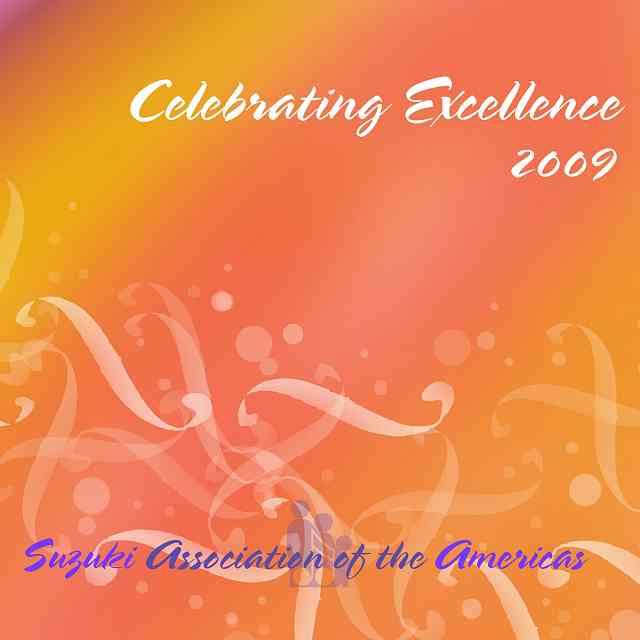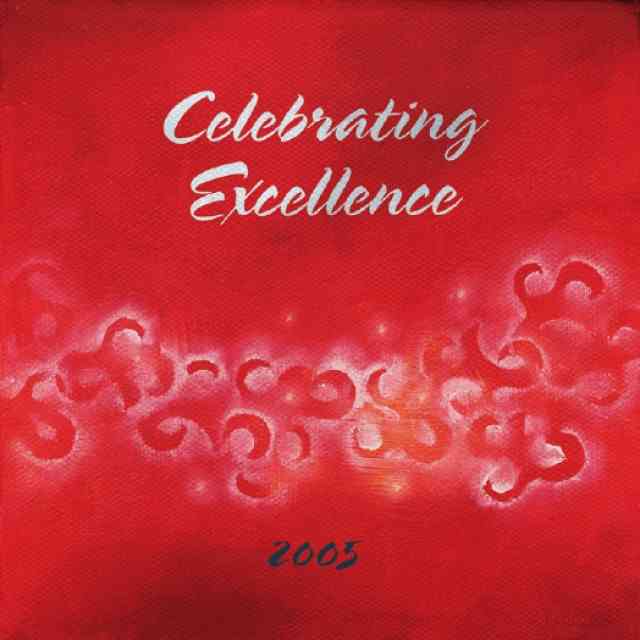
Celebrating Excellence 2005 CD cover
Celebrating Excellence 2005 features musicians who began their careers as Suzuki students. Our thanks to these gracious and talented performers who were willing to share their artistry with Suzuki supporters and friends. What an inspiring tribute to the legacy Dr. Suzuki created!
Program
-
Passacaglia nach der Cembalosuite Nr. 7 g-moll von Handel (7:14) – Johan Halvorsen
Elizabeth Ann Larson, violin; Ilona Kindt, cello -
Julie-O (3:29) – Mark Summer
Amy Sue Barston, cello -
String Quartet in g minor, 1st movement, Anime et tres Decide (6:21) – Claude Debussy
Dryden String Quartet: Nurit bar-Josef, violin; Nicolas Kendall, violin, Daniel Foster, viola; Yumi Kendall, cello -
Paraphrase on Greensleeves (2:06) – Anon., arr. Carlos Salzedo
Cate Cannon Todd, harp -
Fantasy (9:50) – Frederick Jacobi
Cathy Basrak, viola; William Koehler, piano -
Prelude in G Major, Op. 32, No. 5 (3:15) – Sergei Rachmaninoff
Grant Moffett, piano -
Rumanian Folk Dances (1:29, 0:34, 1:17, 1:38, 0:34, 1:07) – Béla Bartók
Brian Lewis, violin; Pamela Viktoria Pyle, piano -
Sonata No. 3 in C major: Allegro assai (5:01) – Johann Sebastian Bach
Katie Lansdale, violin -
Romanza Andaluza (4:57) – Pablo de Sarasate
Christina Castelli, violin; Grant Moffett, piano -
Syrinx (2:48) – Claude Debussy
Sara Traficante, flute -
Sonata in E-flat major, Op. 18: Allegro ma non troppo (11:51) – Richard Strauss
William Preucil Jr., violin, Arthur Rowe, piano -
Csárdás (4:10) – Vittorio Monti
Time for Three: Nicolas Kendall, violin; Zachary Du Pue, violin, Ranaan Meyer, bass
About the Performers
Amy Sue Barston, cello: Amy has appeared as a soloist and chambermusician worldwide, performing at Carnegie Hall, Alice Tully Hall, Chicago’s Symphony Center and at the Ravinia and Caramoor Festivals. At 17 she soloed on TV with the Chicago Symphony and won numerous other prestigious awards. Amy began Suzuki cello studies at age 3 with Nell Novak, later studying with Eleonore Schoenfeld (USC) and Joel Krosnick (Juilliard) for her master’s. Amy has premiered a variety a works written for her by US composers including Mark Summer’s Julie-O (score available through Shar Products). She is an active clinician and teaches at The School for Strings and The Juilliard School.
“I value my Suzuki training above all else.”
—Amy Sue BarstonAmy began her love of cello playing as a pre-Twinkler at the American Suzuki Institute at age three, and continued as a Suzuki student through all the cello books. As a girl, she was most inspired when she spent her summers at Suzuki Institutes, surrounded by wonderful, creative teachers, talented children at all levels, and families with similar beliefs and ideals. Now, she is thrilled to teach and perform at these institutes and to make a contribution to the musical community in which she was raised.
Cathy Basrak, viola: Cathy earned her BM from Curtis Institute. Her teachers include Joseph dePasquale, Michael Tree, and Almita and Roland Vamos. She has performed with the Marlboro, Banff and Norfolk festivals; the Brandenburg and Metamorphosen ensembles; and as soloist with the Chicago Symphony Orchestra, the Philadelphia Orchestra, the Detroit Symphony, the Boston Pops and the Bayerischen Rundfunk Symphonie Orchestra. The winner of several awards, she is Assistant Principal Violist of the Boston Symphony Orchestra and Principal Violist of the Boston Pops.
“I remember looking forward to summer institutes, to reunite with friends, and discover which form I would be living in…the excitement of working with new teachers, and enjoying the opportunity to work with a few special ones year after year.”
— Cathy Basrak
Cate Cannon Todd, harp: Cate began Suzuki violin at age 4, then switched to harp study with Mary Kay Waddington and ShruDeLi Ownbey. She received her performance degree from the University of Utah and has performed extensively as a soloist throughout the US, Canada and Japan, including with the Utah Symphony. A holder of numerous awards, Cate soloed at the Kennedy Center in Washington, DC, as a Presidential Scholar in the Arts when she was 17. She spent the summer of 1993 in Japan observing Dr. Suzuki’s teaching and is currently an established harp teacher. Cate has recorded 2 CDs, Passacaille and Nativity.
“When I first heard that Dr. Suzuki had passed away, I was filled with sadness. It’s not that it wasn’t expected—he was 99 years old! It just seemed as though he would always be an active part of the Talent Education Movement. He was still so strong and alert when my husband and I lived in Matsumoto, Japan in 1993. He’s been known to joke that he would learn to play the harp when he was 113, and I was sure he would live to do it.
“I’ve reflected a lot on the life of this remarkable man, and my sorrow has turned to joy as I’ve considered the impact that he’s had for good. Dr. Suzuki’s was a life to celebrate! This was a man with inspiration and imagination, and coupled with his incredible determination and love for others, he accomplished much. He touched the lives of thousands of families. Parents, teacher and children through the world have come to know him through his inspired method of teaching music.
“Dr. Suzuki had a vision. He capitalized on the fact that children have an amazing capacity to learn. It’s never too early (or too late) to “Twinkle’! Whoever heard of a 1/16 size violin. Or a flute that curves in the middle? Or what about pedal extensions and a folk harp made with the four-year-old student in mind? These are the instruments of the Suzuki method—made to accommodate the youngest and smallest of students.
“From the time that I began violin lessons at the age of four (and later harp at the age of seven) Suzuki has been an integral part of my life. Practice sessions with Mom each morning. Private lessons for nearly twenty years. Institute every summer. I have come full circle from student to teacher, and now I’m circling again as the parent.
“And so I ask, ‘What have I learned from Suzuki?’
“I have learned to love music. While I started out whining before every practice session, I have grown to love the time I spend at the harp. It has become my recreation, my career, my life.
“Suzuki has given me discipline. It takes time and effort to perfect a piece of music, and I’ve discovered the satisfaction that comes when you reach your full potential.
“Suzuki has taught me that music (and life) doesn’t have to be boring. It can be fun and entertaining and exciting. It’s okay to practice with your bow upside down. It’s a lot more fun to play Witches’ Dance when you get to spin your cello. And it’s downright riotous to throw red carnations at the end of Seguidilla!
“Suzuki has taught me that love and goodness are still prevalent in the world. What a thrill it is to see and hear hundreds of students perform together in unison. At a time when there are so many threats facing our children, it is inspiring to see them engaged in a good cause—developing talent, creating friendships and ultimately building a better world.
“And so I ask, ‘What have you learned from Suzuki?’ I am sure you will be touched when you realize the impact that this wonderful man has had on your life. Although he has now passed on, I am sure that we will reap the rewards of Dr. Suzuki’s work for years and years to come.
—Cate Todd
Cate Cannon Todd began her musical career at the age of four, when she started violin lessons through the Suzuki Method. She switched to the harp three years later, studying first with the founder and originator of the Suzuki harp method, teacher and trainer Mary Kay Waddington, and later with famed Suzuki teacher, ShruDeLi Ownbey. Cate has done extensive teacher training and spent the summer of 1993 at the Talent Education Institute in Matsumoto, Japan, observing lessons firsthand from Dr. Shinichi Suzuki. She generously volunteered a beautifully written essay in tribute to Dr. Suzuki and the method.
Christina Castelli, violin: Christina has had acclaimed performances in the US, Europe, Canada and South America. She has performed in recital at Carnegie Hall and was a featured soloist with many orchestras, including the Belgian National Orchestra and the National Symphony. She also appeared as soloist and leader of the International Sejong Soloists and as concertmaster of Metamorphosen Chamber Orchestra. She began Suzuki violin studies at age 3 with Edward Kreitman and later continued study with Roland and Almita Vamos. In 1996, as a Presidential Scholar, she performed at the Kennedy Center and has won several other awards. Christina earned her Bachelor’s in chemistry at Harvard and her Master’s at The Juilliard School, studying with Dorothy DeLay, Hyo Kang and Rohan De Silva. She performs extensively on viola and is an active clinician.
“The Suzuki method enabled me to learn to play the violin well at a very young age by developing my ear and helping me focus on the importance of listening to every note, allowing me to progress rapidly and learn new technique with every new piece I played. The lessons that I learned as a Suzuki student are timeless, and I still find that they are useful to me today in my professional career as a violinist. With a fabulous Suzuki teacher and strong determination from the very beginning, there is nothing that cannot be accomplished on the violin.”
—Christina CastelliMs. Castelli began studying the violin at age three, using the Suzuki method with teacher and trainer Edward Kreitman, and later continued her studies with Suzuki teachers and trainers Roland and Almita Vamos.
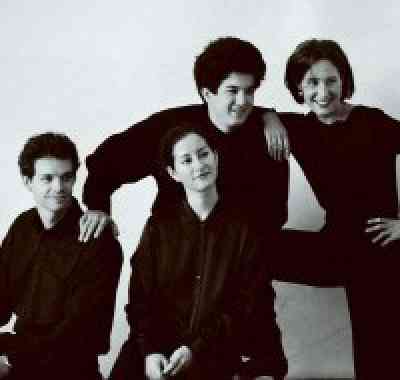
Dryden Quartet (Nurit Bar-Josef, violin; Nicolas Kendall violin; Daniel Foster, viola; Yumi Kendall, cello): Brother and sister Nicolas and Yumi Kendall, their cousin Daniel Foster, and colleague Nurit Bar-Josef founded The Dryden String Quartet in 2002. Nurit is concertmaster of the National Symphony in Washington, DC; Daniel is its principal violist. Yumi is Assistant Principal Cellist of the Philadelphia Orchestra. Nicolas has embarked on a solo career and is a member of the trio Time For Three (see below). Recent performance venues include The Curtis Institute (their alma mater), the University of Maryland (where Daniel is on faculty) and a performance for the Beethoven Society at the German Embassy in Washington, DC. The quartet’s name honors John Dryden Kendall, a founding father of the Suzuki method in North America.
“The opportunity to learn our instruments using the Suzuki method allowed us to develop the listening and ensemble skills which are so essential to functioning as a string quartet. We are extremely grateful for the role the Suzuki method played in reaching our professional musical goals.”
—The Dryden String QuartetThree of the members of the Dryden Quartet are grandchildren of Suzuki teacher and trainer John Kendall, a well-respected violin pedagogue, perhaps most well known for being one of the pioneers of the Suzuki violin method in the United States. In recognition of Mr. Kendall’s influence on the music world as well as on his family, the quartet chose a significant Kendall family name for the group. The Dryden Quartet were featured performers at the SAA conference in Minneapolis in 2004.
Ilona Kindt, cello: A native of Germany, Ilona received her early training in Hannover, coming to the US to study with Zara Nelsova and Harvey Shapiro at The Juilliard School where she also worked with the Guarneri Quartet. She then attended the International Menuhin Music Academy in Switzerland, receiving an Artist Diploma, and holds a Master’s from Rutgers University. The recipient of numerous awards, she has performed in Europe, the US, South America and Africa as soloist and chamber musician in halls such as the Bruno Walter Auditorium, Lincoln Center, the Tonhalle Zurich, the Casino Bern and the Kultur- und Kongresszentrum Luzern. She gives master classes in Europe, the US and South America.
Katie Lansdale, violin: Katie has performed with the Baltimore Symphony, the National Symphony, the Cleveland Chamber Symphony, the New York Repertory Orchestra and the Austin Mozart Festival. She has toured Europe extensively with her Lions Gate piano trio, recording for Triton and Centaur. First lauded as a teen for her performances of Bach at the Salzburg Mozarteum, she has since performed the Bach cycle over a dozen times in the Americas and has a critically acclaimed Bach CD on Cyberphunx Music Productions. She began her studies with Ronda Cole, later studying with Donald Weilerstein, Joseph Gingold, Felix Galimir and Mitchell Stern. Katie studied humanities at Yale and earned graduate degrees at The Cleveland Institute and Manhattan School of Music. Currently on faculty at the Hartt School, she continues her solo and chamber performances, including with NY’s Locrian Ensemble.
“I was extraordinarily lucky to grow up as a Suzuki child. Now, as an adult, a soloist, chamber musician and as a teacher, I continually see more and more dimensions to the profound contributions Dr. Suzuki has made to the musical community at large. These seem to multiply with each generation of Suzuki graduates.”
—Katie LansdaleKatie Lansdale studied with Suzuki teacher and trainer Ronda Cole in Washington D.C. until the age of 18, and in addition to her concertizing and college teaching activities is a frequent clinician at Suzuki programs and institutes.
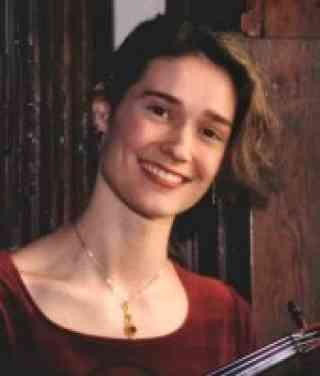
Elizabeth Ann Larson, violin: Elizabeth began her studies at age 3, debuting at age 7 with the Milwaukee Symphony and the Boston Pops at age 11. She went on to win several awards, performing worldwide with many orchestras including the Boston Symphony. Elizabeth was a featured soloist in a concert honoring Yehudi Menuhin on the day of his death in 1999 and at Carnegie Hall’s 50th Anniversary Celebration. Festival performances include Caramoor, Banff, Verbier, Apple Hill, Kronberg and the Rencontres Musicales Internationales. Other international performances include with Yehudi Meuhin’s Camerata Lysy and the Duo Shanti. Elizabeth’s undergraduate studies were at the New England Conservatory and Indiana University. She received her Master’s from Yale, studying with Peter Oundjian, and has done postgraduate work with Yfrah Neaman at London’s Guildhall School of Music.
“The Suzuki method for me has shown not only the value but the pleasure of finding and taking the small step; when you take care in the step by step, and enjoy this, the big is not only possible, it’s inevitable. It is accomplished—and it’s accomplished well. This ‘nugget’ I have taken, amongst others, from the real treasure that is the Suzuki method, not only into performance and in teaching, but also in my life. It has been invaluable!”
—Elizabeth Ann LarsonElizabeth Ann Larson, violinist, began her Suzuki studies at the age of three.
Brian Lewis, violin: Named National Artist of the Year (1998), Brian has had acclaimed concerto debuts at Carnegie, Avery Fisher and Wigmore Halls. Recital debuts include Wigmore Hall, London and Lincoln Center, New York for the Great Performers Series. In addition to numerous radio and television appearances, he has performed at many festivals, including The Evian Festival under Rostropovich and the Cabrillo Festival performing The Red Violin for composer John Corigliano. He is on faculty at UT Austin and The Juilliard School. A student of Eleanor Allen, he began violin studies at age 4, later studied with Tiberius Klausner, and twice went to Japan to study with Dr. Suzuki. Brian holds a BM and MM from Juilliard, where he studied with Dorothy DeLay, Masao Kawasaki and Hyo Kang. Mr. Lewis has also recorded six CD’s, most recently as concerto soloist with the London Symphony Orchestra at Abbey Road Studios in England.
“It was a privilege to study with Dr. Suzuki in Japan as a child. He helped develop my lifelong love of sound and tone production. His belief in the potential for musical and technical growth in all students still inspires me today.”
—Brian LewisAs a student of Suzuki teacher and trainer Eleanor Allen, Mr. Lewis began his violin studies at the age of four, and participated in the Ottawa Suzuki Strings program under the direction of his mother, Suzuki teacher and trainer Alice Joy Lewis. He later twice traveled to Japan where he studied with Dr. Shinichi Suzuki at the Talent Education Institute in Matsumoto.
Grant Moffett, piano: Grant has performed throughout the US and Russiaas both a recitalist and orchestral soloist, including with the Chicago Symphony and the Woodstock Mozart Festival Orchestra. He won the St. Louis Symphony National Young Artists Competition, Grace Welsh Prize for Piano, Kosciuszko Foundation Chopin Piano Competition, Concerto Soloists Young Artist Competition, and the National Foundation for Advancement in the Arts Competition. He began Suzuki piano at age 4 with Virginia Burkhart, with additional studies with Theodore Edel and Donald Walker. Grant holds a Bachelor’s in biology from Harvard and earned his Master’s at The Juilliard School, studying piano with Jerome Lowenthal and chamber music with Rohan De Silva.
“The Suzuki method provided me with an invaluable foundation upon which I was able to develop as a musician. Having the opportunity to have studied with an amazing teacher early on, I was taught important lessons that I continue to use today.”
—Grant Moffett,Mr. Moffett began his piano studies at age four as a Suzuki student of Virginia Burkhart and pursued additional studies with Theodore Edel and Donald Walker.
William Preucil Jr., violin: Bill is concertmaster of The Cleveland Orchestra, and formerly held that post with the Atlanta, Utah and Nashville symphonies. He performed internationally for seven seasons as the 1st violinist of the Grammy Award winning Cleveland Quartet, recording the complete Beethoven string quartets for Telarc, plus works by Haydn, Mozart, Schubert and Brahms. He has also soloed with the Minnesota, Detroit, Rochester, Hong Kong and Taipei symphonies. Mr. Preucil serves as concertmaster and soloist with the Mainly Mozart Festival Orchestra, San Diego, and continues to perform as a member of the Lanier Trio, whose recording of the Dvorak piano trios was honored as one of TIME magazine’s top 10 CDs for 1993. Now on faculty at The Cleveland Institute and the University of Maryland, Bill began studying violin with his mother, Doris Preucil, at age 5, and at 16 graduated from the lnterlochen Arts Academy to attend Indiana University, where he studied with Josef Gingold and later with Zino Francescatti and Gyorgy Sebok. William Preucil is a Global Music Network Artist on the GMN website www.gmn.com
“The Suzuki philosophy gave me my love of music, which has defined my life.”
—William Preucil, Jr.Mr. Preucil began studying the violin at the age of five with his mother, Suzuki teacher and trainer Doris Preucil, a pioneer in Suzuki violin instruction in the United States.
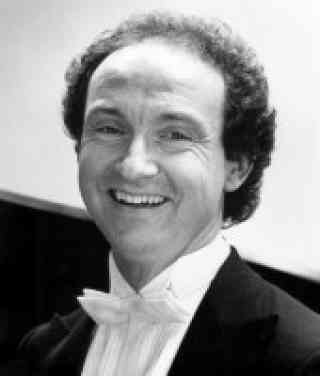
Arthur Rowe, piano: Performing to critical acclaim as a recitalist and soloist with orchestra, Canadian pianist Arthur Rowe is also a renowned chamber musician. While at Indiana University, Mr. Rowe began his 3 decades-long association with esteemed violinist William Preucil. He has performed with the Brentano, Cleveland, Lafayette, Miami and New Zealand Quartets, and as a guest artist at summer festivals in Europe and North America. He is frequently heard on CBC and Public Radio. Mr. Rowe has recorded for Crystal, ebs, Innova, GM and Fanfare records, and will release an all-Schubert recording in 2006 on the Centaur label. Arthur Rowe resides in Victoria, Canada where he is Professor of Piano at the University of Victoria.
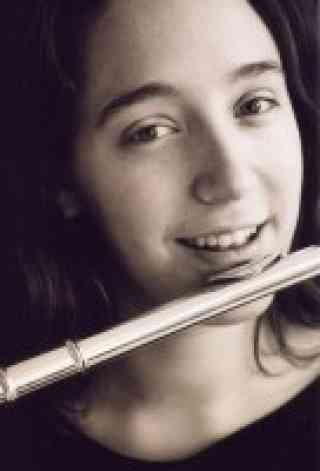
Sara Traficante, flute: Sara began Suzuki flute lessons at age 7 with David Gerry, with later studies under Suzanne Shulman, Bonita Boyd, Anne Harrow (piccolo), and Kristian Bezuidenhout (Baroque traverse). She received her BM from Eastman and her MM from McGill, studying with Timothy Hutchins. Sara was awarded a debut recital for Radio Canada CRC, and has performed as soloist with symphonies and in recital in the US, Canada, Ireland and Taiwan. While at Eastman, she found her love of chamber music in woodwind quintets and mixed trios. An active teacher, her other interests include singing, new music, Balinese gamelan and innovative arts education.
“Studying flute through the Suzuki approach was an extremely rewarding experience for me. Not only was I given the joy of music, but I was also imparted with opportunities to learn and make music with my peers, and study with other fine teachers at workshops and institutes. Being immersed in an environment of fine music making as a child captured my interest and my heart, propelling me to continue in music as my career.”
—Sara TraficanteSara Traficante began flute lessons at age seven with teacher and trainer David Gerry, through the Suzuki approach, and continued further studies with Suzanne Shulman. Sara was recently appointed as flute faculty at Suzuki Music, Ottawa, Ontario.
Time for Three (Zachary DePue, violin; Nicolas Kendall, violin; Ranaan Meyer, double bass): This stylistically eclectic trio has performed widely in the US and Netherlands, including at Paul Newman’s Camp Hole In The Wall, the Kennedy Center, NY’s 92nd Street Y, Rhode Island’s Kingston Chamber Festival and the Philadelphia Folk Festival. Formed while at The Curtis Institute, the trio blends fiddling, Hungarian and Spanish gypsy traditions as well as improvisation and jazz, and has recorded two CDs. Time for Three became affiliated with Astral Artistic Services upon winning its 2003 National Auditions. Zachary studied with Ida Kavafian and Jaime Laredo, making his solo debut with the Toledo Symphony. He has won numerous awards and plays with the Philadelphia Orchestra. Nicolas studied with Victor Dachenko, had an acclaimed Philadelphia recital debut, a quartet performance in Carnegie Hall and appeared with the National Symphony, the St. Louis Symphony and the Metamorphosen Chamber Orchestra. Nick has appeared in the concert halls of Europe, Japan, Kennedy Center, Chicago, Cleveland and San Francisco, amongst others. Ranaan began bass at age 11. He has studied with Harold Robinson, principal bass of the Philadelphia Orchestra and spent summers at the National Orchestra Institute, the FAME Music Festival, and at Gary Karr’s Karr Camp. An accomplished jazz musician, he has performed in numerous jazz festivals.
Heidi Spring, CD cover art: Heidi received a Bachelor of Fine Arts in 2001 from Illinois Wesleyan University where she was a Presidential Scholarship recipient, and a Master of Fine Arts from the University of Brighton in England in 2005. Her area of concentration for both degrees was painting. She grew up as a Suzuki violin student, starting with her mother, Kathleen Spring, when she was four years old. The music she listens to and performs inspires her painting. She feels a painting can be experienced in the same way one would listen to a piece of music. Someone looking at a work of art doesn’t necessarily see it all at once, but rather experiences the work layer by layer as one would hear a piece of music unfold.

